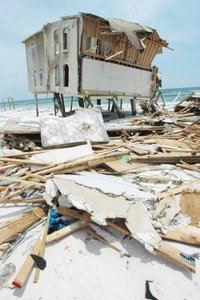
Slightly more than halfway through the 2005 hurricane season and the US National Hurricane Center is already running out of letters in the alphabet.
The latest is Hurricane Rita, the third most powerful hurricane ever recorded in the Atlantic Ocean with winds of over 280 km/hr, currently bearing down on the beleaguered Gulf Coast. This, even while the gruesome accounting of Katrina’s deadly wrath is still being itemized.
The obvious question is: what the hell is going on with our climate?
Given what we know about hurricanes and climate change, it looks like we could be in for nasty weather.
Simply put, hurricanes are heat engines. When tropical ocean temperatures heat up due to human induced climate change, hurricanes have more fuel and can become much more powerful. Ocean temperatures in the Gulf of Mexico are now the second highest on record.
Professor Kerry Emmanuel of the Massachusetts Institute of Technology reported in the journal Nature in August that warmer oceans worldwide are making devastating storms such as Katrina and Rita more likely, by making hurricanes on average more powerful and longer lasting. He found that the destructive power of Hurricanes worldwide had increased by 70% in the last 30 years.
Another paper was published this month in the prestigious journal Science, backing up Emmanuel’s disturbing findings. These researchers found that the number of deadly Category 4 and 5 storms worldwide has almost doubled in the last 35 years.
This is no act of God. The authors of both these papers attributed this disturbing trend at least in part to human-induced climate change.
Professor Emmanuel states that “ future warming may lead to an upward trend in tropical cyclone destructive potential, and taking into account an increasing coastal population a substantial increase in hurricane-related losses in the twenty first century .”
Imagining hurricanes becoming more powerful is like imaging Don Cherry with a louder wardrobe. Even an average sized hurricane packs 200 times more energy than the electrical generating capacity of the entire planet.
While this cold statistic is hard to imagine, the physical evidence of that massive power sadly is not.
The city of Biloxi lay directly in the wake of Katrina and was almost wiped off the map. In one neighborhood virtually every building was entirely gone, swept away by a 20 metre wall of water and winds in excess of 250 km/hr.

The emerging science raises an obvious point: our addiction to fossil fuels is making future disasters like Katrina more likely. Yet President Bush commented this summer with no sense of irony that he chose not to sign the Kyoto protocol because if would have “wrecked the economy”.
It is hard to imagine that the unprecedented destruction of hurricanes like Katrina is a bargain in the eyes of the President. This is already the most expensive disaster in US history – with up $35 billion in insured property losses.
Estimates of total economic losses from Katrina are as high as $300 billion - as much as the combined US military adventures in Iraq and Afghanistan for the last four years, with fully 400,000 lost jobs. If our best science is correct, we can expect more such expensive and deadly calamities in the future.
While the US administration continues to believe that we cannot afford to deal seriously with climate change, the simple fact is that we cannot afford not to.
In the same way that initial Katrina relief efforts were woefully inadequate, the US government’s response to the looming crisis of climate change is similarly meager. The US government spends less than $5 billion annually on alternative fuel research – less than 2% of what Katrina might ultimately cost.
Canada is arguably faring even worse. Of all of the G7 nations, Canada ranks dead last in reducing our emissions. Ottawa has pledged to reduce greenhouse gas emissions by 6% below 1990 levels by 2012. They have instead increased by 20%.
The bottom line is that there is no free lunch. Oil has been remarkably lucrative source of cheap energy for a long time but we are beginning to see some of the externalized costs of our massive consumption.
The bright side - if there is one - is that Mother Nature is trying to tell us something very important. We have an opportunity to both learn and act. Weaning ourselves off our oil addiction will have to happen sooner or later. Further delay it is only going to cause this inevitable transition to be more expensive, and ultimately more tragic.
While no single storm can be attributed to climate change, Katrina and Rita have an important message for us. We ignore that message at our peril.
Will 2005 be remembered as the year of the hurricane? Actually, that was last year…
Mitchell Anderson is a freelance writer living in Vancouver. (Published in the Toronto Star, September 2005)